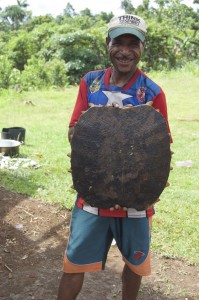Gebusi Reference List – as of November 2019
[All entries authored by Bruce Knauft unless otherwise noted]
Books
2016 The Gebusi: Lives Transformed in a Rainforest World, 4th edition. Long Grove, IL: Waveland Press (1st edition, 2005; 2nd edition 2010; 3rd edition 2013).
2002 Exchanging the Past: A Rainforest World of Before and After. The University of Chicago Press (x + 292 pp., 24 color photographs, map).
1985 Good Company and Violence: Sorcery and Social Action in a Lowland New Guinea Society. Berkeley: University of California Press (x + 474 pp., 37 Tables, 22 Figures, 2 Maps, 16 pp. Photos, 7 Appendices).
Journal articles
2019 Finding the Good: Reactive Modernity among the Gebusi, in the Pacific, and Elsewhere. The Australian Journal of Anthropology 30(1):84-103.
2010 Gebusi Religion and Conversion Revisited: Spiritual Change in the Area of Nomad Station, Western Province, Papua New Guinea. Asia-Pacific Forum 48:8-30.
2003 What Ever Happened to Ritualized Homosexuality? Annual Review of Sex Research
14:137-159.
1993 Like Money You See in a Dream: Petroleum and Patrols in South New Guinea. Oceania 64:187-190.
1990 Melanesian Warfare. Oceania 60:250-311.
1987 Reconsidering Violence in Simple Human Societies: Homicide among the Gebusi of Papua New Guinea. Current Anthropology 28:457-500.
1986 Text and Social Practice: Narrative “Longing” and Bisexuality among the Gebusi of New Guinea. Ethos 14:252‑281.
1985 Ritual Form and Permutation in New Guinea: Implications for Socio‑Political Evolution. American Ethnologist 12:321‑340.
Chapters in edited volumes
Under review “Authorship, Authenticity, Authentification: Critical Reflections Across Four Decades of Work with Gebusi.” In Authenticity, Authorship, and Pacific Island Encounters. Edited by Jeanette Mageo and Bruce Knauft. Berghahn Books.
2011 Men, Modernity, and Melanesia. In Echoes of the Tambaran: Masculinity, History, and the Subject in the Work of Donald F. Tuzin. Paul Roscoe and David Lipset, pp. 103-114. Canberra: Australian National University Press.
2011 Violence Reduction among the Gebusi of Papua New Guinea – and Across Humanity.
In Origins of Altruism and Cooperation. Edited by Robert W Sussman and C. Robert Cloninger, pp. 203-225. New York: Springer. [Available on B. Knauft’s website.]
2007 Moral Exchange and Exchanging Morals: Alternative Paths of Cultural Change in Papua New Guinea. In The Anthropology of Morality in Melanesia and Beyond. Edited by John Barker, pp. 59-73. Burlington, Vermont: Ashgate.
2007 From Self-Decoration to Self-Fashioning: Orientalism as Backward Progress among the Gebusi of Papua New Guinea. In Body Arts and Modernity. Edited by Elizabeth Ewart and Michael O’Hanlon, pp. 88-107. Wantage, Oxon, UK: Sean Kingston Publishing.
2004 Relating to Women: Female Presence in Melanesian “Male Cults.” In Women as Unseen Characters: Male Ritual in Papua New Guinea. Edited by Pascale Bonnemère. Philadelphia: University of Pennsylvania Press.
2002 Not Just for Fun: Formalized Conflict and Games of War in Melanesia. In War and Games (Studies on the Nature of War, Vol. 3). Edited by T. J. Cornell and T. B. Allen. San Marino: Boydell Press / Center for the Interdisciplinary Research on Social Stress.
2002 Trials of the Oxymodern: Public Practice at Nomad Station. In Critically Modern: Alterities, Alternatives, Anthropologies. Edited by B. Knauft, pp. 105-143. Bloomington: Indiana University Press.
1998 How the World Turns Upside Down: Changing Geographies of Power and Spiritual Influence among the Gebusi. In Fluid Ontologies: Myth, Ritual, and Philosophy in the Highlands of Papua New Guinea. Edited by Laurence R. Goldman and Chris Ballard, pp.143-161. Westport, CT: Bergin and Garvey.
1998 Creative Possessions: Spirit Mediumship and Millennial Economy among Gebusi of Papua New Guinea. Bodies and Persons in Africa and Melanesia. Edited by Michael Lambek and Andrew Strathern, pp. 197-209. Cambridge University Press.
1998 [Authored by Eileen M. Cantrell] Woman the Sexual, a Question of When: A Study of Gebusi Adolescence. In Adolescence in Pacific Island Societies. Edited by Gilbert H. Herdt and Stephen C. Leavitt, pp. 92-120. Pittsburgh: University of Pittsburgh Press.
1991 Gebusi. In Encyclopedia of World Cultures, Volume 2: Oceania. Edited by Terence E. Hays, pp. 76-79. Boston: G. K. Hall & Co.
1989 Bodily Images in Melanesia: Cultural Substances and Natural Metaphors. In Fragments for a History of the Human Body, Part Three. Edited by Michel Feher, Ramona Naddaff, and Nadia Tazi, pp. 198-279. New York: Urzone.
1989 Imagery, Pronouncement, and the Aesthetics of Reception in Gebusi Spirit Mediumship. The Religious Imagination in New Guinea, edited by Michele Stephen and Gilbert H. Herdt, pp. 67-98. New Brunswick, NJ: Rutgers University Press.
1987 Managing Sex and Anger: Tobacco and Kava Use among the Gebusi of Papua New Guinea. In Drugs in Western Pacific Societies: Relations of Substance. Edited by Lamont Lindstrom, pp. 73‑98. Association for Social Anthropology of Oceania, Monograph #11. Lanham, MD: University Press of America.
Short published contributions, book reviews, reports, and commentaries
2013 Land Ownership in the Near-Western Nomad Sub-District (Honibo, Oybae, Gebusi, Samo, and Kubor) Western Province, Papua New Guinea. Social Impact Monitoring and Programs (SIMP). [Available on B. Knauft’s website.]
2007 Agency, Subordination, and Change: A Reply to Dwyer and Minnegal. Journal of the Royal Anthropological Society 13:563-565.
